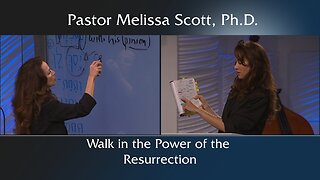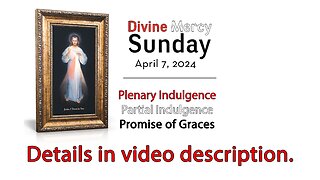Episode 2025: The Power of Confession and Scripture: Finding Mercy and Strength
The Power of Confession: Finding Mercy and Strength
In this episode, we delve into the profound wisdom of St. Isidore of Seville, exploring the transformative power of confession and the importance of scripture reading in the traditional Catholic perspective. We will also reflect on timeless quotes from St. Isidore, accompanied by a scripture reading from the Book of Habakkuk,
(haa-buh-kick) to discover how confession leads to healing, justification, and pardon of sin, while scripture reading nurtures our understanding and love for God.
Starting with the words of St. Isidore of Seville, a saint revered for his profound insights into the Christian faith.
"Confession heals, confession justifies, confession grants pardon of sin. All hope consists in confession. In confession there is a chance for mercy. Believe it firmly, do not doubt, do not hesitate, never despair of the mercy of God."
let's break down this quote from a traditional Catholic perspective:
Healing and Justification: In the Catholic faith, confession, also known as the Sacrament of Reconciliation or Penance, is understood as a means of spiritual healing and justification. Through confession, Catholics believe that they receive the grace of God, which heals the wounds caused by sin and justifies them before God.
Granting Pardon of Sin: Confession is seen as a sacramental encounter with the mercy of God, where sins are forgiven by a priest acting in persona Christi (in the person of Christ). This forgiveness is not merely symbolic but believed to be an actual remission of sins, restoring the individual's relationship with God.
Hope and Mercy: The quote emphasizes that all hope consists in confession, highlighting the profound trust that Catholics place in the mercy of God. Confession is viewed as a source of hope and a chance for mercy, where sinners can come before God with contrite hearts and receive His abundant forgiveness.
Firm Belief and Trust: St. Isidore urges believers to have firm faith and trust in the mercy of God manifested through the sacrament of confession. Doubt, hesitation, and despair are seen as obstacles to receiving the full benefits of confession. Instead, Catholics are encouraged to approach the sacrament with confidence and humility, trusting in God's infinite love and mercy.
Never Despair of the Mercy of God: This phrase underscores the central message of the quote – that no matter how grave one's sins may be, they should never despair of God's mercy. Confession is portrayed as a sacrament of hope and reconciliation, where even the most hardened sinner can find forgiveness and spiritual renewal through the boundless mercy of God.
Overall, from a traditional Catholic perspective, this quote highlights the transformative power of the sacrament of confession in healing, justifying, and granting pardon of sin, while emphasizing the importance of firm belief, trust, and hope in God's mercy.
Confession, according to St. Isidore, is not merely a ritual but a profound encounter with the mercy of God. It heals our wounds, justifies us before the Lord, and offers us the chance to work with Gods boundless mercy.
St. Isidore’s second quote is:
"Reading the holy Scriptures confers two benefits. It trains the mind to understand them; it turns man’s attention from the follies of the world and leads him to the love of God. Two kinds of study are called for here. We must first learn how the Scriptures are to be understood, and then see how to expound them with profit and in a manner worthy of them . . . No one can understand holy Scripture without constant reading . . . The more you devote yourself to the study of the sacred utterances, the richer will be your understanding of them, just as the more the soil is tilled, the richer the harvest.”
let's break down this quote from a traditional Catholic perspective:
Training the Mind: The quote emphasizes that reading the Scriptures is not merely about acquiring knowledge but about training the mind to understand them. In the Catholic tradition, understanding Scripture involves more than just surface-level comprehension; it requires spiritual discernment and guidance from the Holy Spirit.
Turning Attention from Worldly Follies: The Scriptures serve as a beacon that redirects our attention from the distractions and temptations of the world towards the love of God. This aligns with Catholic teaching on detachment from worldly desires and attachments, focusing instead on the eternal truths found in Scripture.
Two Kinds of Study: St. Isidore highlights the importance of two distinct approaches to studying Scripture: first, learning how to interpret the Scriptures correctly (exegetical study), and second, exploring how to apply and expound upon them in a manner that honors their sacredness (theological study).
Constant Reading: The quote emphasizes the necessity of regular and continuous engagement with Scripture. This echoes the Catholic tradition's emphasis on lectio divina, a method of prayerful reading and meditation on the Scriptures to deepen one's relationship with God.
Richer Understanding with Devotion: St. Isidore draws an analogy between studying Scripture and tilling soil. Just as the richness of the harvest increases with devoted tilling of the soil, so too does our understanding of Scripture deepen with devoted study and reflection. This highlights the idea that spiritual growth requires ongoing effort and dedication.
Overall, from a traditional Catholic perspective, this quote underscores the transformative power of Scripture in shaping the mind, directing the heart towards God, and fostering spiritual growth through diligent study and reflection.
St. Isidore emphasizes the transformative power of scripture reading. It not only enriches our understanding of God's word but also directs our hearts toward His love. Through constant study, we cultivate a deeper relationship with the divine and nourish our souls with spiritual sustenance.
Now lets finish up this episode with scripture.
Reading: Habakkuk 3:19 - "God, the Lord, is my strength; he makes my feet like hinds’ feet, he makes me tread upon my high places."
prophet Habakkuk is saying In God, we find our ultimate strength and guidance. He uplifts us, enabling us to navigate life's challenges and walk confidently in His ways.
let's break down this scripture from a traditional Catholic perspective:
God as Strength: In the Catholic tradition, God is recognized as the ultimate source of strength for believers. This verse acknowledges God as the Lord who provides strength to those who trust in Him. Catholics believe that through prayer, sacraments, and faith, individuals can draw upon God's strength to overcome challenges and obstacles in their lives.
"He makes my feet like hinds' feet": This imagery of feet being made like hinds' feet symbolizes agility, speed, and sure-footedness. In a spiritual sense, it suggests that God enables believers to navigate life's difficulties with grace and confidence. It reflects the idea that with God's help, believers can traverse even the most treacherous terrain of life without stumbling.
"He makes me tread upon my high places": This phrase speaks to God's elevation of the individual to positions of honor, authority, or spiritual maturity. In Catholic theology, this could be understood as God guiding and empowering believers to rise above worldly concerns and attain spiritual heights. It may also refer to God leading individuals to overcome personal challenges and achieve victory in their spiritual journey.
Overall, from a traditional Catholic perspective, this scripture emphasizes God's role as the source of strength and guidance for believers. It encourages trust in God's providence and acknowledges His ability to empower individuals to overcome obstacles and reach spiritual fulfillment.
Thank you for joining me this morning and taking the time on this journey of reflection and inspiration. Until next time, may God's mercy and strength be with you always. Now go out there and convert somebody. Good Holy Thursday!
-
 33:47
33:47
CatholicReboot
1 month ago $0.04 earnedEpisode 2069: The Power of Redemption: The Mysteries of Grace
131 -
 30:01
30:01
CatholicReboot
1 month ago $0.06 earnedEpisode 2095: Understanding Through Faith and Obedience
120 -
 58:22
58:22
Pastor Scott's Nuggets by Pastor Melissa Scott, Ph.D.
1 month ago1 Corinthians 15, Revelation 1:14-16 - Walk in the Power of the Resurrection
189 -
 39:18
39:18
Handinhandwithgodtv
1 month agoMentions You @ Power To Triumph || Don't Violate The Conscience Of The New Convert || April 19, 2024
1 -
 1:03:47
1:03:47
TheFourthWatch
1 month agoSpiritual Warfare Daily - Episode 10 - 4.17.24 - God's Power and Authority - Psalm 18
1612 -
 18:30
18:30
Our Lady's Chapel
2 months ago $0.07 earnedDivine Mercy (2nd SUNDAY of EASTER) - April 7, 2024 - HOMILY
24 -
 35:14
35:14
Handinhandwithgodtv
1 month agoMentions You @ Power To Triumph || Look Unto Jesus, Our Faith Author & Finisher || April 15, 2024
1 -
 17:37
17:37
Gods Plan Your Part
1 month agoJohn 16 | The Holy Spirit: Comfort and Victory Amidst Trials
5 -
 38:21
38:21
Handinhandwithgodtv
1 month agoMentions You @ Power To Triumph || Whether Married Or Not, Use Your Time For Jesus || April 12, 2024
2 -
 4:08
4:08
Bible Study | VerseVisionaries.com
1 month agoEmbracing Forgiveness | John 8:7
27